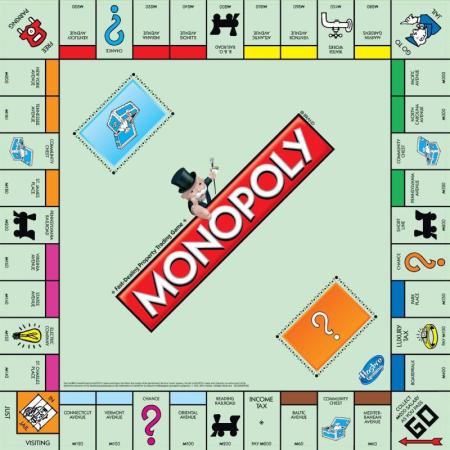Monopoly is one of the most popular board games in the world, and its history is full of interesting twists. While it is often attributed to Charles Darrow, the true story behind the game involves another person and an evolution over time.
The Early Origins (1903-1904)
The original concept of Monopoly is based on a game created by Elizabeth Magie, an American woman and activist. In 1904, Magie patented a game called "The Landlord's Game," which was designed to teach players about the injustices of monopolies and the concentration of economic power. The game's design featured a square board with properties for players to buy, and a central rule was that rent and fees became higher the more properties a player owned, much like the rules of Monopoly.
Elizabeth Magie created it as a critique of the economic policies of economist Henry George, who advocated for a land value tax. Her original version had two sets of rules: one "simplified" for quicker play and a more complex one that demonstrated the negative effects of monopolies.
Charles Darrow and the Commercialization of the Game (1930)
Although Elizabeth Magie’s concept was innovative, it wasn't until the Great Depression of the 1930s that the game began to gain popularity. In 1934, Charles Darrow, a middle-class man living in Philadelphia, came across a version of the game while visiting friends. Unlike Magie’s version, Darrow adjusted and simplified the rules and presented the game with a new design, changing some of the properties and incorporating real street names from Atlantic City, a coastal city in New Jersey where he lived.
Darrow modified the board to make it more attractive, using bright colors for the properties and creating property cards corresponding to the streets of Atlantic City. After some playtesting, he presented his version of the game to the Parker Brothers toy company in 1935. Although Parker Brothers initially rejected the proposal, citing issues with the game's rules and length, Darrow persisted. He continued promoting the game, and eventually, Parker Brothers accepted his proposal and purchased the manufacturing rights.
The Game Becomes Famous (1935)
Parker Brothers began producing the game under the name Monopoly in 1935. While Darrow was initially credited as the creator, it was later discovered that Elizabeth Magie had created the original concept. Despite this posthumous recognition, Darrow received the public credit and fame for popularizing the game. In 1936, Magie sold her patent to Parker Brothers, but she did not receive the attention she deserved for her contribution to the concept.
Monopoly’s success was meteoric, especially during the Great Depression, when many people were seeking affordable forms of entertainment. The game provided an escape from reality, allowing players to experience the American dream of owning properties and becoming wealthy, making it highly attractive.
Expansion and Evolution
After its launch, Monopoly grew in popularity and was adapted to many countries, with customized versions of the properties and rules. Over the decades, there have been various themed editions, such as those based on movies, TV shows, and other cities and countries.
In terms of evolution, Monopoly has changed over the years. In addition to the classic version, there are deluxe editions, electronic versions, and even online versions that can be played on mobile devices and digital platforms.
Fun Facts
- The Atlantic City Version: The original Monopoly edition, created by Darrow, used real streets from Atlantic City, such as Boardwalk and Park Place.
- The Copyright Issue: Although Elizabeth Magie invented the original concept, Darrow made it famous, leading to controversy over the intellectual property of the game.
- The Characters: The iconic characters, like Mr. Monopoly (or "Rich Uncle Pennybags"), were added later and have become recognizable symbols of the game.
- Cultural Impact: Monopoly is not just a game; it has had a significant cultural impact, inspiring movies, video games, books, and even studies on its effect on people and economics.
List of Properties
- Mediterranean Avenue
- Community Chest
- Baltic Avenue
- Income Tax
- Reading Railroad
- Oriental Avenue
- Chance
- Vermont Avenue
- Connecticut Avenue
- Jail (Just Visiting or In Jail)
- St. Charles Place
- Electric Company
- States Avenue
- Virginia Avenue
- Pennsylvania Railroad
- St. James Place
- Community Chest
- Tennessee Avenue
- New York Avenue
- Free Parking
- Kentucky Avenue
- Chance
- Indiana Avenue
- Illinois Avenue
- B&O Railroad
- Atlantic Avenue
- Ventnor Avenue
- Water Works
- Marvin Gardens
- Go to Jail
- Pacific Avenue
- North Carolina Avenue
- Community Chest
- Pennsylvania Avenue
- Short Line Railroad
- Chance
- Park Place
- Luxury Tax
- Boardwalk
- Go
In summary, Monopoly is a game with a rich history, starting as a social and economic critique by Elizabeth Magie, modified by Charles Darrow, and ultimately becoming one of the best-selling and most-played board games in the world. Over the years, it has maintained its relevance and remains a landmark in the world of board games.








